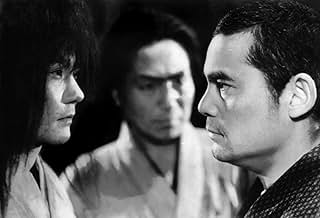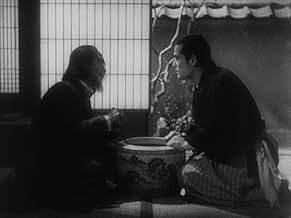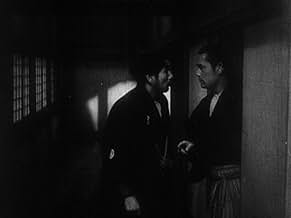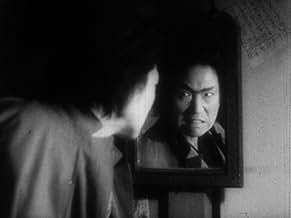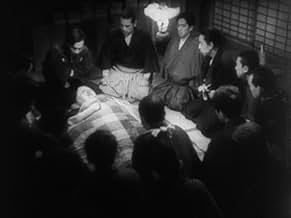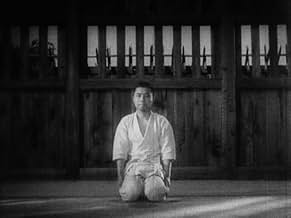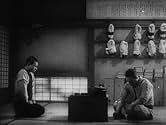CALIFICACIÓN DE IMDb
6.0/10
3 k
TU CALIFICACIÓN
Sanshiro Sugata tiene que enfrentarse a nuevos retos y luchar contra adversarios cada vez más difíciles, pero no por ello dejará de aprender, a través de las artes marciales, una filosofía q... Leer todoSanshiro Sugata tiene que enfrentarse a nuevos retos y luchar contra adversarios cada vez más difíciles, pero no por ello dejará de aprender, a través de las artes marciales, una filosofía que le permitirá orientar su vida.Sanshiro Sugata tiene que enfrentarse a nuevos retos y luchar contra adversarios cada vez más difíciles, pero no por ello dejará de aprender, a través de las artes marciales, una filosofía que le permitirá orientar su vida.
- Dirección
- Guionistas
- Elenco
Kô Ishida
- Daisuburo Hidarimonji
- (as Ko Ishida)
Osman Yusuf
- American Sailor
- (as Osman Yusef)
- Dirección
- Guionistas
- Todo el elenco y el equipo
- Producción, taquilla y más en IMDbPro
Opiniones destacadas
I have seen every Akira Kurosawa movie available on VHS or DVD and this is the first "bad" one among them. In fact, I will be so bold as to say I doubt he really directed it. His name is on the credits but I don't see a shred of him in the work. No environmentally framed shots, no contrasts of light and dark, no horizon dividing the frames. He must have done this one with a week of shooting time or a budget of 50 Yen. The comical fight between the Judo stylist and Karate stylist literally made me laugh out loud. It looked like parody. Nothing like the climatic fight in the first Sugata Sanshiro. Also the subtitles were apparently done by someone in China who could speak a little Japanese and a little English. They use the word "karate" for both karate and judo, and since the main conflict is between the two styles, you'd better pay attention to who's doing the the talking or you'll never follow the plot. The movie just about "braked" me.
I ended my recent review of "Sanshiro Sugata" by a sneaky remark. I alleged that the lead actor Susumu Fujita was no Toshiro Mifune... and I wish I could have found a more pleasant way to put it.
Now, let me reformulate. As true as it might be that Fujita doesn't have the same range, charisma or 'magnitude' than international icon Mifune, it is as unfair as comparing Harry Carey Jr. To John Wayne. And after that weird and rather corny opening, his appearance was quite a welcome sight. Indeed, something about the first minutes of the sequel of "Sanshiro Siguta" (which I prefer to refer to as "The Legend of the Great Judo") really set me off. The drunken Yankee sailor (played by Osman Yusuf!) kept blabbering some American slang with a rather convincing accent but the rickshaw was playing it it (no pun intended) as if he was playing in a Mac Senntt film.
Fujita's entrance changes the tone. He looks stern, menacing, and oddly intimidating. The confrontation did not leave much for suspense; it was obvious that for his opening fight scene would be an easy win. Still, whatever is wrong with the sequel has nothing to do with Fujita, who delivers a memorable performance as the young, idealistic and well-meaning martial arts student. It is a good thing because Siguta is in such a perpetual self-doubt that his quest could have taken a trilogy. I doubt it would have helped Kurosawa's career and I am sure he was more than glad to change this after the war. Therefore, at the end Siguta reaches his personal nirvana after Kurosawa stretched his arc as far as he could.
For the rest, it takes a while for the film to find its tone as it keeps being entangled in the necessity to make a point about the art of judo's superiority over boxing, the decadent export of US. Apparently Kurosawa was somewhat forced into making the film a propaganda by underlining without any attempt at subtitlity that boxing incarnates a failure of civilization that is so opposed to the quest of Judo... but for that, Americans are barely present and are replaced by a Japanese manager who's a caricatural sellout. While the film is by no means mediocre, it is not the master's finest hour and you can tell that if it wasn't for that propaganda subtext, it could have made for a better experience. It doesn't help that the image and sound quality (obviously not restored) make it difficult to appreciate.
Now the film is slightly better when it makes connections with the previous one and shows Sigita struggling to forgive himself for the death of Yono's father (played by Shimura in the first film) and when all of sudden, two strange long-haired characters who look like coming from a fantasy horror film and with expressionnist shadows decide to come to revenge their brothers, leading to a climax set in the snow-covered mountains. Iy is so magnificent you'd think it was borrowed from another film... and come way too late in the film.
Overall, it is a decent film but, the result is so beneath the standards of excellence of Kurosawa and of intelligence, that it will probably satisfy some history buffs looking for expressions of propaganda Japanese film and naturally the completists. Apart from that, it is a warmup before Toshiro Mifune who was certainly the muse Kurosawa needed (with Shimura being the touchstone)
Now, let me reformulate. As true as it might be that Fujita doesn't have the same range, charisma or 'magnitude' than international icon Mifune, it is as unfair as comparing Harry Carey Jr. To John Wayne. And after that weird and rather corny opening, his appearance was quite a welcome sight. Indeed, something about the first minutes of the sequel of "Sanshiro Siguta" (which I prefer to refer to as "The Legend of the Great Judo") really set me off. The drunken Yankee sailor (played by Osman Yusuf!) kept blabbering some American slang with a rather convincing accent but the rickshaw was playing it it (no pun intended) as if he was playing in a Mac Senntt film.
Fujita's entrance changes the tone. He looks stern, menacing, and oddly intimidating. The confrontation did not leave much for suspense; it was obvious that for his opening fight scene would be an easy win. Still, whatever is wrong with the sequel has nothing to do with Fujita, who delivers a memorable performance as the young, idealistic and well-meaning martial arts student. It is a good thing because Siguta is in such a perpetual self-doubt that his quest could have taken a trilogy. I doubt it would have helped Kurosawa's career and I am sure he was more than glad to change this after the war. Therefore, at the end Siguta reaches his personal nirvana after Kurosawa stretched his arc as far as he could.
For the rest, it takes a while for the film to find its tone as it keeps being entangled in the necessity to make a point about the art of judo's superiority over boxing, the decadent export of US. Apparently Kurosawa was somewhat forced into making the film a propaganda by underlining without any attempt at subtitlity that boxing incarnates a failure of civilization that is so opposed to the quest of Judo... but for that, Americans are barely present and are replaced by a Japanese manager who's a caricatural sellout. While the film is by no means mediocre, it is not the master's finest hour and you can tell that if it wasn't for that propaganda subtext, it could have made for a better experience. It doesn't help that the image and sound quality (obviously not restored) make it difficult to appreciate.
Now the film is slightly better when it makes connections with the previous one and shows Sigita struggling to forgive himself for the death of Yono's father (played by Shimura in the first film) and when all of sudden, two strange long-haired characters who look like coming from a fantasy horror film and with expressionnist shadows decide to come to revenge their brothers, leading to a climax set in the snow-covered mountains. Iy is so magnificent you'd think it was borrowed from another film... and come way too late in the film.
Overall, it is a decent film but, the result is so beneath the standards of excellence of Kurosawa and of intelligence, that it will probably satisfy some history buffs looking for expressions of propaganda Japanese film and naturally the completists. Apart from that, it is a warmup before Toshiro Mifune who was certainly the muse Kurosawa needed (with Shimura being the touchstone)
Though not impressed with the original Sanshiro Sugata I did consider it a noteworthy film in Japanese movie history and certainly had its charm.
The sequel see's our judo fighter hero presented with further foes he must vanquish and more moral dilemmas. Ontop of this he finds himself pressured into participating in an east vs west/boxing vs judo bout.
This sequel was heavily criticized and considered a propaganda film (Of which there were many around this time coming out of Japan). Truth be told I don't understand why or how this could be considered such, there was no military/political motivation to be found.
Inferior to the original? Yes, but not by much. The Sanshiro Sugata movies have their merits but don't deserve (In my opinion) the critical acclaim they recieved. I'm curious what happened with the sequels and quite look forward to finding out.
The Good:
Follows on from the original well
The Bad:
Looks dated even for its time
Things I Learnt From This Movie:
Susumu Fujita was reincarnated as Mark Dacascos
Fighting barefoot in the snow for real, there should be an oscar category for such feats!
The sequel see's our judo fighter hero presented with further foes he must vanquish and more moral dilemmas. Ontop of this he finds himself pressured into participating in an east vs west/boxing vs judo bout.
This sequel was heavily criticized and considered a propaganda film (Of which there were many around this time coming out of Japan). Truth be told I don't understand why or how this could be considered such, there was no military/political motivation to be found.
Inferior to the original? Yes, but not by much. The Sanshiro Sugata movies have their merits but don't deserve (In my opinion) the critical acclaim they recieved. I'm curious what happened with the sequels and quite look forward to finding out.
The Good:
Follows on from the original well
The Bad:
Looks dated even for its time
Things I Learnt From This Movie:
Susumu Fujita was reincarnated as Mark Dacascos
Fighting barefoot in the snow for real, there should be an oscar category for such feats!
Akira Kurosawa's third film, released a year after The Most Beautiful (which he made for his wife) (actually, if it weren't for the lousy search function of Douban, there'd be no need to repeat this sort of objective reality in a review).
Akira Kurosawa himself, in his autobiography "Toad's Oil", doesn't seem to recognize much of the cinematic value of this "sequel to Zizan Sanshiro", which coincides with the popular aesthetic, the biggest criticism being the lyrical patriotism, similar to that in the modern-day Ip Man, an element that was loathed in the movies 60 years ago, and is still the case 60 years later. It's just obvious that the director, who has influenced Western cinema many times over in terms of casting and dramatization, naturally has his own insights. In the "Zi San Shiro sequel" will rarely see so involved, Kurosawa has shot, so low mobilization of nerves of film and television subject matter, at this point, I think the domestic film and television industry is still worth looking back at history to learn.
But the master is a master, after all, in the "Zi San Shiro sequel" we did not see colorful on that bad bridge too much continuation, but is point to the end, in the end oriented to the benevolence of the evil of revenge on the ending. It's as if when countless critics were giddy as if they were watching this talented Japanese director have some cracks in him, Akira Kurosawa once again backtracked on the theme of human kindness so that his early style wouldn't be so clearly labeled as patriotic.
Even now, as a director who has just made two movies, in his early work has revealed extremely artistic light and composition, in dealing with multiple people standing, not only makes people wonder if Antonioni has come here to steal the division.
Akira Kurosawa himself, in his autobiography "Toad's Oil", doesn't seem to recognize much of the cinematic value of this "sequel to Zizan Sanshiro", which coincides with the popular aesthetic, the biggest criticism being the lyrical patriotism, similar to that in the modern-day Ip Man, an element that was loathed in the movies 60 years ago, and is still the case 60 years later. It's just obvious that the director, who has influenced Western cinema many times over in terms of casting and dramatization, naturally has his own insights. In the "Zi San Shiro sequel" will rarely see so involved, Kurosawa has shot, so low mobilization of nerves of film and television subject matter, at this point, I think the domestic film and television industry is still worth looking back at history to learn.
But the master is a master, after all, in the "Zi San Shiro sequel" we did not see colorful on that bad bridge too much continuation, but is point to the end, in the end oriented to the benevolence of the evil of revenge on the ending. It's as if when countless critics were giddy as if they were watching this talented Japanese director have some cracks in him, Akira Kurosawa once again backtracked on the theme of human kindness so that his early style wouldn't be so clearly labeled as patriotic.
Even now, as a director who has just made two movies, in his early work has revealed extremely artistic light and composition, in dealing with multiple people standing, not only makes people wonder if Antonioni has come here to steal the division.
Sanshiro Sugata 2 (1945)
** 1/2 (out of 4)
Kurosawa's sequel has Sugata (Susumu Fujita) still growing in the world of judo but outsiders are wanting to make the fighting style a sport and put it up against American boxing. This is a rather strange film but I do think it's better than the original just because of how out there it is. I've read that the government forced Kurosawa into making this and you can tell because that plays a part in the film. American boxing is really looked down upon and fighting as a sport is shown to be evil and this really translates to Kurosawa being unhappy as he was forced to make this just like the characters here are being forced to do something they see as morally wrong. Seeing the different fighting styles mixed up together was pretty fun as was the ending, which takes place during a snow storm. Fujita is a lot better here than he was in the previous film and really delivers a strong performance and makes his character quite memorable with the difficulties that he faces. The film's biggest problem comes in form of some rather choppy storytelling that has the film wonder off from its main goal way too many times and this is certainly true in the final fifteen-minutes before the final showdown. The low-budget nature of the film also shines through in a negative way but I'm sure the fans of the director will want to watch this at least once.
** 1/2 (out of 4)
Kurosawa's sequel has Sugata (Susumu Fujita) still growing in the world of judo but outsiders are wanting to make the fighting style a sport and put it up against American boxing. This is a rather strange film but I do think it's better than the original just because of how out there it is. I've read that the government forced Kurosawa into making this and you can tell because that plays a part in the film. American boxing is really looked down upon and fighting as a sport is shown to be evil and this really translates to Kurosawa being unhappy as he was forced to make this just like the characters here are being forced to do something they see as morally wrong. Seeing the different fighting styles mixed up together was pretty fun as was the ending, which takes place during a snow storm. Fujita is a lot better here than he was in the previous film and really delivers a strong performance and makes his character quite memorable with the difficulties that he faces. The film's biggest problem comes in form of some rather choppy storytelling that has the film wonder off from its main goal way too many times and this is certainly true in the final fifteen-minutes before the final showdown. The low-budget nature of the film also shines through in a negative way but I'm sure the fans of the director will want to watch this at least once.
¿Sabías que…?
- TriviaThe final fight scene was filmed outdoors in real snow. Susumu Fujita, fighting barefoot, had to be carried to a bonfire between each shot as his feet would go numb.
- ConexionesFollows La leyenda del gran judo (1943)
Selecciones populares
Inicia sesión para calificar y agrega a la lista de videos para obtener recomendaciones personalizadas
- How long is Sanshiro Sugata, Part Two?Con tecnología de Alexa
Detalles
- Fecha de lanzamiento
- País de origen
- Idioma
- También se conoce como
- Sanshiro Sugata, Part Two
- Locaciones de filmación
- Toho Studios, Tokio, Japón(Studio)
- Productora
- Ver más créditos de la compañía en IMDbPro
- Tiempo de ejecución
- 1h 23min(83 min)
- Color
- Mezcla de sonido
- Relación de aspecto
- 1.37 : 1
Contribuir a esta página
Sugiere una edición o agrega el contenido que falta

